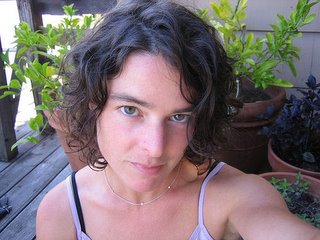curving along bumpy streets
Nabokov, who emigrated to America as an adult, wrote of his English skills: "I think like a genius, I write like a distinguished author, I speak like a child." His lecture notes were, more properly, illuminated essays, with emotive marks and emphases penciled in. He never gave spoken interviews; without his crib-sheet, he felt, he spoke like a child.
Apart from the genius-author bit, I would feel like that too, except that all the children I have known are truly genius when it comes to language learning. Watching Axel learn language has been one of the most fascinating experiences of my life. A child's brain is so elastic, so flexible: after the first few words, they begin to assimilate words and syntax, first on a weekly, then daily, and eventually, hourly rate. Since we arrived in Lviv, Axel has learned almost as many new words as I, only his are in English, terms for experiences and objects we don't come across in California.
An adult learning language is handicapped by what she already knows, and the brain's general unwillingness to forget. A little bit forward, a lot bit back, as slowly words begin to stick and syntax to take shape. The foreign city began to take shape in similar fashion: my first ventures out with Axel, I used the varicolored shop signs as landmarks, bright valentine's pink, orange, red and turquoise marked small grocers, bars, cell phone and shoe stores. A few days later, the infrastructure of the streets began to solidify in my mind, and I realized that Lviv isn't that large after all. We can walk most places in 15-30 minutes.
Which was a useful bit of information when I realized that the #8 tramway (visim'ka) which we'd planned on taking to the cemetery seemed to be out of operation. After a couple of "troikas" passed us by, we decided to walk the tramway route towards the cemetery. We passed a few landmarks that Axel recognized (the building under construction where a black stray cat lives, the market where he searched for a firetruck, passed on an ambulance, and bought a cement mixer instead) and a grandmother who inched along with two canes and platform shoes. Axel fell asleep, and we found ourselves slightly past downtown, just past an old canal structure, where we stood to wait for the #7 to take us the rest of the way there. Three passed in the opposite direction. People craned their necks in passing busses to glimpse Axel's odd carrying contraption (the Ergo). The grandma with her canes passed by. Axel still slept.
At this point, Mychal and I gave up on our cemetery trip and decided to wander around old town. We walked through an underground passage, emerging above ground by ancient-seeming walls towering over an empty, moss-lined canal. Inside the walls we found an old church, walked past a large cistern protected by iron fretwork. We stepped into St. Andrew's Church, a flashy, gold-encrusted, high-ceilinged Renaissance affair where they sang of Mary's suffering and I tried not to weep. Axel still slept. Beggars holding small plastic cups flanked the doors, a man on the street explained the building was built in the 17th century, on a plot where a much older, wooden church had stood.
We walked further, along the cobblestone streets (which Axel has named "bumpy streets;" "did they make this street bumpy?" he asks), heading towards the craft market. Axel's subconscious noticed the tarp-covered booths, and he woke demanding a side trip to the market.
Apart from the genius-author bit, I would feel like that too, except that all the children I have known are truly genius when it comes to language learning. Watching Axel learn language has been one of the most fascinating experiences of my life. A child's brain is so elastic, so flexible: after the first few words, they begin to assimilate words and syntax, first on a weekly, then daily, and eventually, hourly rate. Since we arrived in Lviv, Axel has learned almost as many new words as I, only his are in English, terms for experiences and objects we don't come across in California.
An adult learning language is handicapped by what she already knows, and the brain's general unwillingness to forget. A little bit forward, a lot bit back, as slowly words begin to stick and syntax to take shape. The foreign city began to take shape in similar fashion: my first ventures out with Axel, I used the varicolored shop signs as landmarks, bright valentine's pink, orange, red and turquoise marked small grocers, bars, cell phone and shoe stores. A few days later, the infrastructure of the streets began to solidify in my mind, and I realized that Lviv isn't that large after all. We can walk most places in 15-30 minutes.
Which was a useful bit of information when I realized that the #8 tramway (visim'ka) which we'd planned on taking to the cemetery seemed to be out of operation. After a couple of "troikas" passed us by, we decided to walk the tramway route towards the cemetery. We passed a few landmarks that Axel recognized (the building under construction where a black stray cat lives, the market where he searched for a firetruck, passed on an ambulance, and bought a cement mixer instead) and a grandmother who inched along with two canes and platform shoes. Axel fell asleep, and we found ourselves slightly past downtown, just past an old canal structure, where we stood to wait for the #7 to take us the rest of the way there. Three passed in the opposite direction. People craned their necks in passing busses to glimpse Axel's odd carrying contraption (the Ergo). The grandma with her canes passed by. Axel still slept.
At this point, Mychal and I gave up on our cemetery trip and decided to wander around old town. We walked through an underground passage, emerging above ground by ancient-seeming walls towering over an empty, moss-lined canal. Inside the walls we found an old church, walked past a large cistern protected by iron fretwork. We stepped into St. Andrew's Church, a flashy, gold-encrusted, high-ceilinged Renaissance affair where they sang of Mary's suffering and I tried not to weep. Axel still slept. Beggars holding small plastic cups flanked the doors, a man on the street explained the building was built in the 17th century, on a plot where a much older, wooden church had stood.
We walked further, along the cobblestone streets (which Axel has named "bumpy streets;" "did they make this street bumpy?" he asks), heading towards the craft market. Axel's subconscious noticed the tarp-covered booths, and he woke demanding a side trip to the market.




0 Comments:
Post a Comment
<< Home